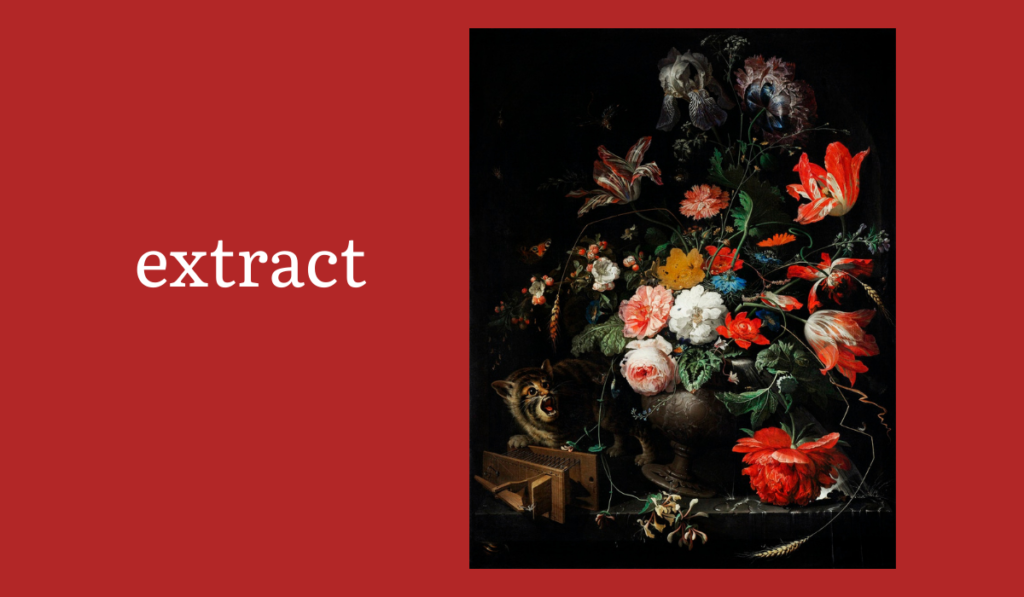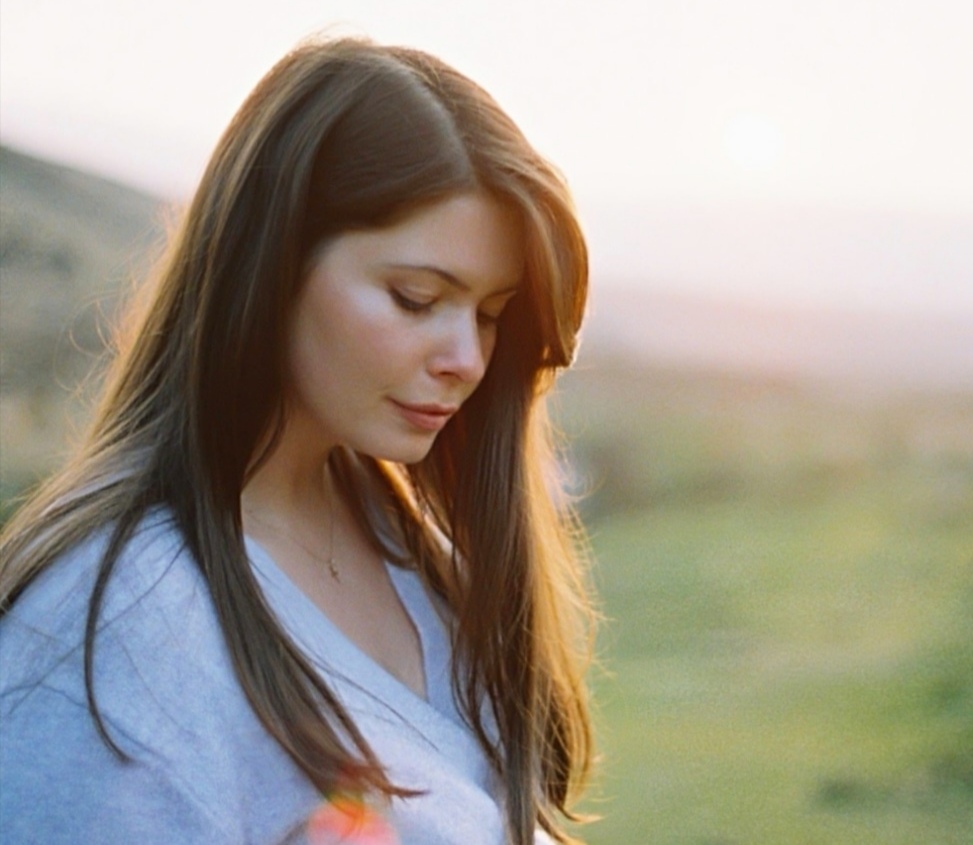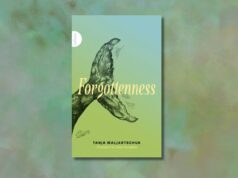
In the Orangery
by R.M.Clarke
They would not need to do much about flowers, Mari had said, for the whole space was wound with flourishing passionflower tendrils.
Over the years the arms of the plant had been teased around the stone pillars and spun around the beams of the original domed roof. Now in high summer it was flush with alien looking flowers, their raucous stamen protruding like a child’s brazen tongue. The loose arms dangled dangerously low; when one stood up from their chair, hair and soft-fibred clothes were gripped by the trailing hooks searching for a place to cling. Later in the summer, when the flowers had curled back in on themselves and underwent the hardening into purple fists that concealed the fragrant fruit, they would be picked by someone and sent to the kitchens, where they would be turned into the curd that kept year-round in the pantry.
When they were teenagers, in the summers that Derbhaile spent there in flight from the claustrophobic pressure of her mother’s house, Mari’s mother had assigned fruit-picking to them both. Over the years, even as they grew into young women, the tradition had held. Until the accident; until Derbhaile’s departure. To spend time in that space now was to sit close alongside the happy afternoons that had passed but would never be repeated again.
Looking at her friend sitting across the table from her, so much subdued who was once a vibrant, tomboyish teenager, Derbhaile wondered how she felt now, sitting and demurely taking tea when so many harvests had been spent scrambling up ladders, pelting at one another the hard, sour fruits. But she did not linger on these thoughts for long; the room was so bright, so full of light, fragrant with the green smell of growing things.
***
In a fortnight Martin and Sara would be wed here. There was not enough space for the dinner; that would take place in a marquee elsewhere on the estate. But in a fortnight they would all be dressed in their wedding outfits, Mari and Nick on either side of the bride and groom, and Derbhaile looking up at them from the pews, and the ceremony would take place.
Derbhaile imagined herself in white, walking the slow walk up the long atrium and coming to rest under the bulb of the dome, the light streaming down upon her.
The image made her want to move somehow; she was taken over by the sudden desire to stretch. Raising her arms up to the sky as though she were reaching for a passion flower, she cried, ‘The light in here, the light!’
Mari raised her eyebrows at her, but did not respond. She was folded up neatly in the chair like a parcel, her crossed legs winding around one another at the ankle. Derbhaile marvelled when other women’s legs could do that; even to cross her legs, with their heavy thighs, was uncomfortable. She did not recall having ever seen Mari look so small. She could have tied her up with a bow.
‘How does this room not make you want to start painting again?’ Derbhaile said. She was unusually vibrant, something she could not attribute to anything other than the room itself and the prospect of tea, for Nick had not come last night, she had hardly slept, and she had not seen him at breakfast.
Mari looked at her friend in a measured way. ‘I thought I told you how I felt about that sort of question?’
She had said it quietly, in a way that suggested no ill feeling and yet it was then when she had said it that it struck Derbhaile how in the three years of her being away in France something between them had shifted. It was as though there were parts of themselves they had exchanged. Mari had been the one given to outburst and sudden, public displays; Derbhaile had always been quiet and controlled, passive in everything, standing a little in the wake of her. It was strange now, she thought, for her to lose briefly this reserved character that she was used to, but once Mari had spoken like that Derbhaile had retracted, settling back into her chair quietly. Mari picked some flint off her cuff, sighing with a sense of what seemed like relief, and sat up straight.
‘What do you think, Mari?’ Derbhaile asked her friend in a subdued way, for still Mari had not said anything that she considered a response, and in fact Derbhaile felt that she had to keep saying things for the conversation to go along, for there was something distracted about Mari, Derbhaile had noticed as the days passed in the house, at mealtimes and on the rare occasions she managed to persuade Mari to go walking with her, something anxious and divided. It was as though the joy she had felt at first at Derbhaile’s arrival had soured, or fallen short somehow, and Derbhaile felt that it was something in her that had changed, something she was lacking.
‘What?’ Mari asked a little bewildered. Then: ‘Oh yes, the light.’
But she said no more after that, and Derbhaile thought it would be wiser to drop it. Mari smiled blandly at her and leant forward to pour the tea they had been waiting on and Derbhaile had the sensation – and she’d never had it before – that Mari was humouring her, was in fact bearing her company as one would the attentions of a distant relative, out of duty and politeness.
She knew then that between them had opened a large chasm (she was to blame for it, she knew). She had not realised until that moment that theirs was a relationship that had thrived on a prolonged proximity, driven by her own determination to stay as close to Mari and her family as often as possible. Had she not insisted on her summers with the family after Mari had left for the English school, and thereafter followed Mari to London and imposed upon her in the London flat, she wondered, now, if their relationship would have continued as long as it had.
***
Derbhaile had always been trailing behind Mari, trying to keep up. In a way there was something deeply incompatible about the two of them – they had come from such different worlds, and it fell to Mari to educate Derbhaile on the one she belonged to, for Mari, and even Derbhaile herself, had no interest in the one Derbhaile had by birth belonged to.
She had always looked to Mari to tell her who she was, how to spend her time, how to dress, what to love, even what and how to eat.
It had struck Derbhaile as odd that what had begun as an act of worship and uncertainty – going to art school in Mari’s wake – had turned out to be the most successful and guided decision of her life. There she had, by complete accident, alighted upon a latent gift she possessed. She learned about herself, who had never before turned her focus upon herself but always outward, watching the people around her – watching Mari – that she had the gift of seeing. What she had always suspected in herself as a failing of her character, this outward focus, was her greatest strength.
She was surprised by this, surprised to find herself so praised by her tutors, people she immediately identified as superior and complete in a way she knew she never could be. She was singled out for her work, and though this was new and discomfiting it was not unwelcome. She had assumed that the art school, like most of her experiences as Mari’s friend, would be yet another place in which she stood slightly behind the shoulder of Mari. But the art school was the one neutral territory that Mari and Derbhaile occupied together: in all other situations of their lives together it was Derbhaile intruding on Mari’s world. Until art school, she had always been the second twin, trailing behind the strong one, the protector, the way forger. She had always known herself as supplicatory in nature, and now she was learning how it was to be looked towards as an innovator, and she had no idea how it had come about.
Mari did not hold Derbhaile’s unexpected success against her. She was proud, a pride perhaps tinged with an element of relief in seeing Derbhaile succeed in establishing in her own life a little more, happy that she had at last found something of her own. Well, that was how Derbhaile had seen it – for Derbhaile had always been coveting Mari’s life, her way of living and dressing, studying how she held herself, the pace and nonchalance with which she ate. She had been acutely observing Mari and her world since she was young. She knew how to absorb details, seen and unseen. And if the professors at her college had not taken a special interest in her she would likely have gone through life never noticing this about herself, always looking to Mari instead to provide her with her own context and meaning.
She had been a great success, singled out early on by the tutors and cultivated by their attention and praise. It was another strange turn of things that as someone who came to be so praised and awarded for her skills in seeing, and reproducing that vision faithfully, there was so much that she grasped as beyond the line of her vision.
***
One of her professors, a lithe-bodied and beautiful man who wore unrumpled linen suits and a silk scarf neatly around his throat regardless of the weather, took a keen interest in her, more still than the others. He favoured sea tones, dressed always in shades of blue, green, grey and white, and always looked perfectly put together, so neat that Derbhaile marvelled that he was a painter at all. He was a man with the strange ageless look of someone who could be at once in their thirties and sixties. He had praised, particularly, the sensuality of her vision, the embodiment of her work; her attempt, he said, to make real what would remain ephemeral and fleeting. It was he who had encouraged her to seek out the work of other Irish artists, leading her to discover her beloved Scott, beginning her love affair with gold leaf. When she used gold leaf in her works, she felt she was in the act of capturing sunlight, making that ungraspable but essential element grounded and somehow material.
She would always be in the act, she knew, because she would never succeed. Nevertheless, she persisted. As her professor said, she liked to assign herself impossible tasks.
She also liked this professor – she knew him only as Edward – because he did not overstep a boundary that would have been all too easy to do. She had often found she needed to be on guard with men who praised her work. Often such praise was only given with an expectation of reward, as though their mere attention was the first step in a transaction that she was obliged to complete.
Edward, however, ageless as he was, also lacked a sense of definable sexuality. She often wondered about him. Was he married? Did he love another man? Was he asexual? But just as she had tried and failed to assign to him a particular age, she could not pinpoint him in any direct way either when it came to his preferences. There was about him an impersonal element that rebuffed her every attempt to confine him by definition, a quality, Derbhaile noticed, that was shared by statues of marble and bronze, other great works of art, emblems of divinity.
She still kept in touch with him. He kept a distant but constant eye on the progress she made in her career, and often reached out to congratulate her on press mentions and developments, heaping upon her his refined and exultant praise. He never failed to attend her gallery openings and owned a number of her works, and she had come to rely upon him, as one might rely upon the certainty of the sunset after a particularly troublesome day. She would not have made it, she knew, were it not for him. He had given to her by virtue of his attention a sort of immunity against the many pitfalls involved in a career in art, and she knew she had failed to fully appreciate this, and would never be able to repay it, not that he would want her to.
‘You remember Edward?’ Derbhaile asked her friend.
‘From school?’ Mari replied lightly, but of course there were no others.
‘He wore the most beautiful suits,’ Derbhaile said.
‘I always remember him as rather strange.’
‘Strange, how?’ Derbhaile said, her voice harder than she’d expected it would be, as though the words were closing around him as a sort of protective barrier.
Mari looked at her levelly and began a new thought: ‘You know, Derbhaile, sometimes I find it difficult to say anything around you.’
With that hardness in her voice rigid and unmoving and a sense of anxiety starting up in her chest, Derbhaile said, ‘And how’s that now?’
‘I never know when something I say will set you off. It’s like,’ Mari sighed and looked up to the domed ceiling, ‘you’re made of all these trap lines. There are so many ways to set you off, and it’s simply exhausting trying to anticipate it.’
When she’d finished speaking, she folded her hands on her lap. They sat in a tight, uncomfortable silence for some moments, Derbhaile searching for the right language to assuage the situation, but failing, her throat collapsing inwards like a ruined house. The tea was cooling in the china cups, untouched. Mari stood up abruptly.
‘I’m going to go upstairs for a bit,’ she said.
‘Now?’ Derbhaile asked, but she was already moving off and Derbhaile let her go without attempt at reconciliation.
To chase after her and soften what had passed she would have to ignore the surge of anger that had risen at Mari for so swiftly changing the tone of the afternoon, an afternoon that had been lovely only moments before in the beautiful light of her favourite room. Mari had been quiet and strange since breakfast, yes, but the light and the gently swaying tendrils of passionflower in that large and dignified space had won out over it. She did not stand from her chair. She let Mari’s stubborn footsteps soften into silence down the hall. She would not go after her; she would stay in the light of her favourite room. She would raise her face up to it; in fact, she would enjoy it better alone.
***
Why did Mari have to insist upon her dislikes about people and situations, play the devil’s advocate whenever Derbhaile showed enthusiasm or interest? Why did she have to draw everything back to herself? She was a vacuum, sucking up everything good that Derbhaile had. She had long known this.
But Derbhaile had done well without her, in spite of her, she thought with sudden bitterness, lowering her face to the empty chair in front of her. She had watched many of the others around her in the art school – ones determined to be seen as important, ones with great ambitions to change the face of the art world, and talent, too – she had watched them often rebuffed and curtailed by the censure or criticism of the professors. They were strict with all of them, but when these ones received criticism it was as though a rug was being tugged out from under them, they lost their balance, and sometimes crashed to the ground.
She had seen then how her ignorance when it came to her own life and its trajectory had worked in her favour. Her detachment from herself, her own lack of ambition, she came to realise, was what had served her most in her success as an artist. When she was criticised she welcomed it, because she had never expected any less, feeling inept and at sea in all she did. It was the ones – and Mari was among them – who were desperate to prove something that took these criticisms to heart.
For Mari her identity as an artist had always been something she’d carefully guarded; it had been the thing that distinguished her as apart from her family. Though she had always been a naturally gifted rider, she turned away from it in an effort to strike against the hold of her family name. She differed from Derbhaile in the sense that where Derbhaile floated, allowed herself to be led, Mari was determined and fixed in all her desires. She would go to art school; she would be an artist, a great one. And she had done well there, but she had not managed to excel in the way that Derbhaile had. Privately, Derbhaile thought that cruel, and crueller still was the blow she had been dealt with the accident, making impossible, or at least tantalisingly out of reach, her dreams.
Derbhaile would have liked then to rewind the moment back before the conflict and ask her friend to sit for her. In the way she had been, dressed all in cream and beige that in the radiant sunlight streaming undisturbed through the great dome of the orangery enrobed her in a surreal and static light that expanded her diminutive outline far beyond its confines.
But she would not go after her now. Had she asked her when the time was right she knew she would have been granted permission, but she was glad she had not asked, because Mari would have said yes though she would have hated each moment of the sitting, the waiting and being forced to sit still, and watching as Derbhaile displayed and flourished her prowess and skill that had increased in the years that had passed. Even if she had wanted anything but that moment sitting for her friend under the passionflower, Mari would not have refused her.
Instead, Derbhaile went upstairs to gather her materials, returning swiftly and setting up her stand and inks in the same room before the light had shifted. She liked to prop her paper up almost vertical, though she knew that it was not the usual method with inks; it made the thin paint run down the page. But she liked her edges to spill over.
She liked to see how the painting would form when the paint had freedom; she felt then that she had invited God into the piece.
She tried to predict what path each globe of ink would take, would two or more merge together into a great river, or would they all keep to their separate paths? It was like watching the world being formed, each ripple set in motion and choosing its own way. She was always pleased when her predictions were wrong. It made her more certain that there was something else behind all this, that a hidden hand was ushering her and everyone else, that an unfelt breeze was blowing her through life.
***
She moved the table out of the way and set up quickly. At first, she focused on painting the setting, leaving a hollow centre where her subject would take her place beneath the swaying purple-green tendrils. The dominance of the golden white light streaming through the curved glass dome, the faded blue and green of the sky and gardens, were only touched upon, suggested. The hollow centre awaited its subject. She was avoiding it, she knew. She was dancing around the middle, the place where she was meant to be concentrating her focus. She was beginning to add detail to some of the flowers; she stopped herself. She thought of how the light would touch her. She had to restrain herself from racing ahead to the moment at the painting’s end when she would choose the areas in which to apply the gold leaf. In either extreme, whether labouring over the background or racing ahead to the gold leaf she knew she was finding ways to avoid what she had set out to do.
A feather floated past one of the windows. She watched it disappear into a lilac bush. Birds lost their feathers like Derbhaile did her hair every time she ran her fingers through it – it was a marvel, she sometimes thought, that she had any left. When she washed it in the shower or the bath, it would come out teeming and tangled in sometimes shocking quantities. Each time, these many tangled strands would leave her, and all it took in some cases was a shake of her head (all of life was a continuous act of loss). In her flat in Marseille, her cat Negra’s sharp little hairs were everywhere: on every blanket, every surface, collecting in the corners of the kitchen in between sweeps, and yet she never lost her lustre or her determined blackness. Nevertheless she still worried every time it came out like that, in thick black clots.
The day was windy, the trees making a racket with their symphonious roar. It was overcast again, but still oppressively warm, like something in the skies was slowly building. Beneath her light dress, Derbhaile felt the sweat bubbling up. The leaves trembling together at once in this way reminded Derbhaile of a disturbed ocean, its wild, boorish waves. The horses of the sea, its wild horses, she had often heard them called. In this disturbed wind, the magpies were skittish and on the wing, their cackling black and white ordinariness.
If she paid attention though, Derbhaile knew there was more to them, she knew her attention would be repaid with the magpie’s hidden brilliance – the rich iridescence of feathers that only the sun could coax out – their green, ocean blue and violet, like the wild plants that emerged after dark in far off places. How much they concealed in their dull monochrome jackets. But anything would gain in fascination with proper attention; there was nothing dull in the world.
Except, perhaps, her painting. With an effort of will, she returned to the work, applying herself to the border and the boundaries, setting the stage wherein she would finally begin to work the reason. Something caught her eye then, a breeze or the sense of one, a slight disturbance in the air around her; perhaps a tendril swaying as they were sometimes known to do, powered by the plant’s unseen and buried heart. The room felt airless and still.
***
Glancing up, she saw just above Mari’s vacant chair a small butterfly dancing, a vibrant collision of red and white bordered in harsh lines of black.
It hovered above where she imagined Mari’s left shoulder would be sitting were she there still. It danced as though it was performing for her, teased and illuminated by her attention. It lingered around the empty chair, a dervish come off its moorings, wings like stained glass in the church on the hill in her abandoned French city, the church that housed the Golden Madonna and her child. The black ink of the wings worked like lead, holding together the bright white, the amber glow, the pools of red.
How to study a butterfly that was either always in flux or camouflage? And yet here was once asking to be seen. Mariposa, was another word for it. She did not know why she liked that one better. It seemed to reflect the way they moved. The mariposa would not rest, nor did it seem interested in the temptation of tendrils studded with the many flowers above her; she was content to dance for this audience of one. The sunshine coming through the glass roof was lighting up Mari’s chair like a spotlight, the dancing thing neon in the light, melting into the sunshine, dematerialising as she watched.
‘What are you working on now?’ a voice asked. She turned swiftly, startled. It was Nick.
‘Is that meant to be Mari?’
It was only in these moments when she was not seeking or expecting him, one of those brief moments of respite from his constant presence in her mind, that he appeared. He had an instinct for her distraction. She wondered if it were not proof of some inherent greed he possessed, for each night she had been here she had waited against her own will and he had not come. She had sensed him before she knew he was there, even before he had spoken, for it was as he was speaking that already she was in the act of turning around; instinctively she had turned, too quickly, for she saw him hastily compose his face into its usual mask of ironic amusement before which she had caught, very briefly, a fleeting expression of anxiety.
‘I suppose it is,’ she said lightly, pretending above her beating heart, pretending she had not seen his face change the way she had seen it.
She turned back to the piece and frowned, hoping in the sudden interruption, the jolt it had given her, to see with eyes refreshed. In the centre of the canvas, something was beginning to take shape. Mari’s expression surprised her: it was colourful, almost exultant. The butterfly had fought its way in, too, hovering at her left, just above where her arm ended abruptly like an unfinished sentence. There was much left to do, but she was getting along with it and she was not displeased.
She had almost forgotten about him again when he asked, ‘Will you come for a walk?’
She did not answer at first or turn but continued to observe the painting. In some distant way she began to register that she was hungry. She did not know if she had long missed lunch.
‘A walk?’ she said at last, keeping her back to him and dipping her paint brushes in water and drying them slowly, trying out new ways to postpone her agreement.

R.M. Clarke began her career as an actress in 2006, later moving into voiceover and writing. Her stories have been widely published and her debut novel, The Glass Door, won the Discovery award at the Dalkey Book Festival and The Irish Writers Centre Greenbean Novel Fair 2016. It was published by Dalzell Press in 2018. She is editor of and contributor to The Broken Spiral anthology in aid of the Dublin Rape Crisis Centre, published in 2017 with the assistance of Dublin UNESCO City of Literature. She holds the Gold Medal in English from Trinity College Dublin. A new novelette, ‘Underground,’ to be published by Open Pen, is in the works (2022). She lives in Wicklow, Ireland.
For more about The Lasting, contact Paul Feldstein at The Feldstein Agency.












